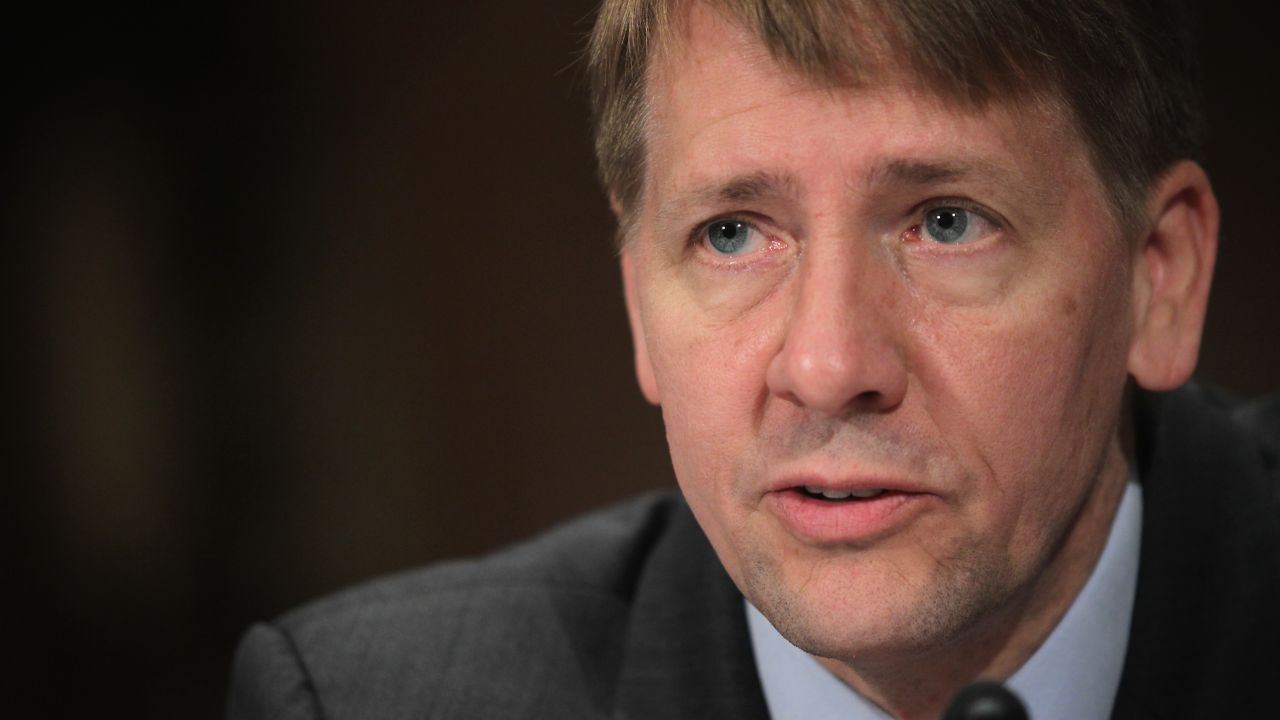
Consumer Financial Protection Bureau Director Richard Cordray testifies during a hearing before Senate Banking, Housing and Urban Affairs Committee on Capitol Hill on Sept. 9, 2014. (Photo by Alex Wong/Getty Images)
This post originally appeared at The Nation.
The regulatory mole inside the deregulatory Trump administration has decided to exit. Richard Cordray, director of the Consumer Financial Protection Bureau, announced today that he would resign by the end of the month. It’s a great blow to consumers facing the usual array of financial deceptions.
Cordray was among the last of the Obama-era officials still leading a federal agency. His five-year term wasn’t to end until July 2018, and, though Republicans constantly pressured President Trump to fire him, Trump could do so only for a specific cause, which could have led to a major lawsuit and a nontrivial likelihood of Trump’s businesses and even his tax returns being implicated, because a potential legal issue would be whether Trump fired Cordray because of personal liability.
In other words, Cordray was somewhat protected from being canned. Trump himself reportedly said he didn’t want to make Cordray a martyr by firing him. So why wouldn’t Cordray stick it out until next July, maximizing the difference he could make in the lives of consumers before Trump chose some corporate lawyer or bank CEO to replace him?
Part of the answer lies in the vote last month to overturn the CFPB’s arbitration rule, which would have protected a consumer’s right to join a class-action lawsuit over a financial dispute. Congress brushed aside the bad publicity of the Equifax and Wells Fargo scandals to nullify the CFPB rule; Vice President Pence supplied the tie-breaking vote in the Senate, and President Trump eagerly signed the legislation (albeit behind closed doors).
So Congress and the president made very clear that any advance through CFPB rulemaking to assist consumers would be summarily slapped down, effectively curtailing the agency’s authority. CFPB has one big rule outstanding: an initiative to add an ability-to-pay requirement to payday loans. But that rule isn’t set to take effect until July 2019, a year after Cordray’s term would have expired. Whether that rule ever saw the light of day was always going to be up to Cordray’s replacement. Any subsequent rule-making would likely have the same problem.
If rule-making is as a practical matter nullified, all Cordray would have left to dictate is enforcement. This is obviously important — CFPB has recovered $12 billion for almost 30 million consumers in its six years of existence. But there are two additional considerations.
First, everyone suspects that Cordray resigned early so he could run for governor of Ohio. An appearance at the AFL-CIO’s annual Labor Day picnic in Cincinnati in September didn’t quiet those rumors. Cordray, a former state attorney general, state treasurer and state House member, faces a Feb. 7 deadline to file for the governor’s race. And he would become the likely favorite, as the rest of the Democratic field hasn’t been able to win statewide in Ohio. Maybe he’s resigning a couple months months early, but you need some time before the May primary to assemble a campaign. And I would argue that you can do more good with the governorship in Ohio for four to eight years than the directorship of a neutered CFPB for another eight months.
By the way, I find the chatter that Cordray’s leaving a federal agency to run for office thus makes CFPB overly “political” to be absurd. Cordray was an Ohio politician; returning to politics is perfectly acceptable. Most of his counterparts flip out of federal agencies to go work for the entities they regulated, or as lawyers for those entities, or as lobbyists for the same. Ben Bernanke advised a hedge fund after stepping down as Federal Reserve chair. That undermines the credibility of the government far more than someone’s trying to transition from upholding consumer protection laws to representing the people of Ohio.
There’s one additional factor. The CFPB director gets a five-year term, regardless of who sits in the White House. As noted, there are barriers to firing the director. Quitting early means that President Trump gets to name a successor early. But it also means that individual’s five-year term will expire in 2022 rather than 2023. If Trump loses re-election, it means that a Democratic successor would get to name a replacement earlier in her term.
Obviously, the political calculations of this don’t matter all that much to consumers, who will now lose the cop on the beat watching over predatory lenders and unscrupulous financiers. They were going to lose that watchdog anyway, of course. But that doesn’t soften the blow. Over the years, Cordray’s CFPB sanctioned credit-card firms for selling phony add-on products, mortgage companies for deceiving borrowers and Wells Fargo for issuing fake accounts. It has sued companies that defraud student-loan borrowers and sneaky debt-relief companies that pose as government agents. All of that enforcement will evaporate, just as total Securities and Exchange Commission penalties for wrongdoing fell sharply in the first year with a Trump-appointed leader.
There’s really no chance that anyone but a bank-supporting hack will soon run this agency, even on a temporary basis. The White House quickly announced that it would soon “announce an acting director” in addition to the nominee to supplant Cordray. This has become a real scandal under Trump. Usually, when an agency head steps down, the first deputy gets elevated to the top slot until confirmation of a replacement. But the Trump administration has installed loyalists over that line of succession.
At the Office of the Comptroller of the Currency, Trump took a bank-defense lawyer off the street and put him in charge of one of the most important bank regulators. More recently, David Kautter, a former Ernst & Young executive who snuck through confirmation to a lower-level Treasury position this August after a hearing held in a secret room off the Senate floor, just became acting IRS commissioner this week. So immediately, someone in line with Trump’s deregulatory impulses will take over CFPB and call off the dogs. The identity of that person, or the eventual confirmed director, is almost irrelevant.
That’s a serious problem for anyone with a loan. It was also inevitable after Trump’s election. Cordray probably did the right thing by leaving early, seeking a position where he can better serve the public. But, for bank customers, this is certainly a sad day.




